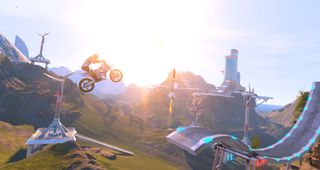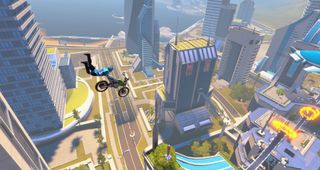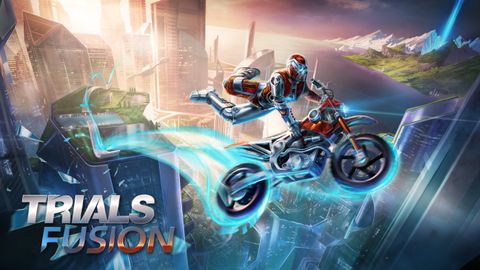GamesRadar+ Verdict
Pros
- +
Great use of physics creates a substantial but conquerable challenge
- +
Incredibly addicting despite the difficulty
- +
Massively prolonged lifespan thanks to online leaderboards and level editor
Cons
- -
FMX tricks are finicky and unintuitive
- -
City-based levels look overly similar
- -
Story elements feel totally superfluous
Why you can trust GamesRadar+
In the sequel-filled gaming ecosystem we now live in, experimentation should be encouraged. The Trials series has typically gone with what it does best: motorcycle obstacle courses that create a unique blend of hardcore 2D platforming, time-trial racing, and physics puzzles. Those qualities are still going strong in Trials Fusion, but they've make room for some intriguing new elements: a futuristic setting, some semblance of a plotline, and the ability to pull off tricks beyond the traditional flips and wheelies. Turns out, less is sometimes more--but Trials Fusion still gets enough right to be well worth your time.
The heart and soul of Trials Fusion is its impeccable use of physics, which makes your rider and bike feel like an extension of your body. Trials only makes you work with three movement variables (forward or backward leaning, the gas pedal, and the brake), which means all of the challenge lies in mastering your momentum to overcome some diabolically tricky level layouts. The finely tuned physics organically create countless toe-curling moments, usually when you're teetering between sticking the landing and careening backwards to your doom. It's a minute-to-learn, lifetime-to-master kind of mechanic--and no matter how skilled you get, it always feels incredible to nail a jump with a panicked, impromptu backflip.

Fusion trades in courses set on dirt mounds and construction yards for utopian vistas from the far future (which, for whatever reason, are still riddled with errant explosives). Your custom-costumed rider may not have a name, but his Homer Simpson-esque screams (as he plunges 40 stories to his death or snaps his neck on an overhang) are all the personality you'll need. At first, you'll kill this poor man constantly; a couple of hours in, however, and you might just glide across the checkered hologram in record time with nary a wipeout. But no matter how flawless your runs, you're always treated to hilarious--and shockingly varied--scenes of injury after you cross the finish line. If you can appreciate the slapstick of a biker crashing into exploding barrels at the bottom of a ravine or accidentally nuking himself and an entire city, these bonus animations will have you in stitches.
Because this is a technologically advanced setting, your bike also gets a voice: SynDI, the wistful, two-wheeled AI who dreams of something more. Don't worry--she's nowhere near as annoying as the sentient vehicle from LocoCycle, at least at first. Dialogue in a Trials game is torture for perfectionists and gold medal seekers, because you'll hear the same quips over and over while restarting for a faultless run. The repetition inherent to this kind of brutally difficult platforming really magnifies how meaningless the dialogue actually is, no matter how amusing the jokes are when you first hear them.


Trials Fusion's local multiplayer is pretty much what you'd expect: a series of brief, streamlined stages for up to four players, with most of the challenge or need for dexterity taken out of the equation. It's great as a party game, as you watch four ill-fated bikers flail around or fall down bottomless pits--but the limited track selection and minimal customization options make it pretty short lived. For my money, asynchronous competition via the leaderboards is the highlight of Trials Fusion's multiplayer, and kept me glued to the screen for hours in an effort to prove my biking superiority.
While the futuristic spin is neat, it introduces some blatant problems to the Trials formula. Although the neo-metropolitan backgrounds are graphically gorgeous, they end up feeling a little samey, opting for pristine, almost plastic-looking environments instead of gritty, earthy landscapes. There are plenty of outdoor tracks set in temple ruins and dense jungles, though they only show up halfway through the 42-stage progression. And even if the visuals are crisp and colorful, they're sometimes obscured by excessive bloom lighting or nighttime dimness. In a Trials game, losing sight of your rider for even a split second becomes a massive handicap.
It's also harder than it should be to come to grips with the FMX trials, which teach you how to pull off stunts with the right analog stick. It's neat to see your rider pull off a Superman or pose proudly with his feet on the handlebars, but successfully getting the trick you want feels way too finicky. You only activate a trick animation when your bike and body are oriented in the proper directions; if you're even slightly off-balance, your rider will just awkwardly gyrate on the seat before landing in groin-shattering agony. The tricks offer no tangible benefit during the regular timed stages, so there's no incentive to work them into your playstyle beyond the FMX mini-games.

Trials Fusion is at its best when it simply focuses in on its greatest strength: incredibly challenging stage design that forces you to improve, with instantaneous retries to minimize any frustration. It's impossible to beat the later levels through sheer luck--you need to master the delicate art of bunny hopping and practice your leaning finesse if you want any hope of a bronze medal, let alone a spot on the leaderboards. The leaderboards themselves provide much of the fun, since you can race against your friends' ghosts or observe the masters at work with easy-access replays of the top times. Between the quest for platinum medals, unlockable bikes and outfits, Easter eggs in every stage, and the ludicrously skilled competition on the leaderboards, Trials Fusion's replay value is through the roof. Even if you ace a track with record speed, there will always be a faster time to beat.
Depending on the creativity of you and your peers, that replay value goes even farther with the powerful level editor. This mode gives you everything you need to craft tracks of equal or greater entertainment value than the included stages, letting you tweak anything and everything you see fit. Sharing your creations with others--and sampling levels made by your fellow bikers--is a cinch, and adds hours of enjoyment on top of Trial Fusion's already near-limitless replayability.
As a series, Trials has always excelled at finding the fun in tenacity, and Fusion is no different. Even if the FMX tricks and inconsequential narrative don't add all that much--and, at worst, muddle the mixture--the core gameplay remains inherently addictive and gratifying. If nothing else, Trials Fusion attempts to do something different with an established formula--and while you shouldn't give it points for trying, the perpetually fun gameplay makes it so that you won't have to.

Trials Fusion delivers more of what you want: addictively challenging obstacle courses, complete with precision controls and highly competitive leaderboards. The futuristic setting and subplot don't add much, but they (usually) don't detract from the fun either.
This game was reviewed on Xbox One.
More info
| Genre | Arcade |
| Description | The arcade racer returns with new tricks and more maps |
| Platform | "PS4","PC","Xbox One","Xbox 360" |
| US censor rating | "Everyone 10+","Everyone 10+","Everyone 10+","Everyone 10+" |
| UK censor rating | "","","","" |
| Release date | 1 January 1970 (US), 1 January 1970 (UK) |
Lucas Sullivan is the former US Managing Editor of GamesRadar+. Lucas spent seven years working for GR, starting as an Associate Editor in 2012 before climbing the ranks. He left us in 2019 to pursue a career path on the other side of the fence, joining 2K Games as a Global Content Manager. Lucas doesn't get to write about games like Borderlands and Mafia anymore, but he does get to help make and market them.

The Witcher spin-off has reportedly been scrapped and will "most likely" be part of season 4

Persona veteran's new JRPG Metaphor: ReFantazio attempts to bridge real-time and turn-based combat in a move Final Fantasy has tried to make work for years, and it's out in October

Diablo 4 dev is sending 666 buckets of literal bugs to "meat their maker" at a charity for hungry birds

